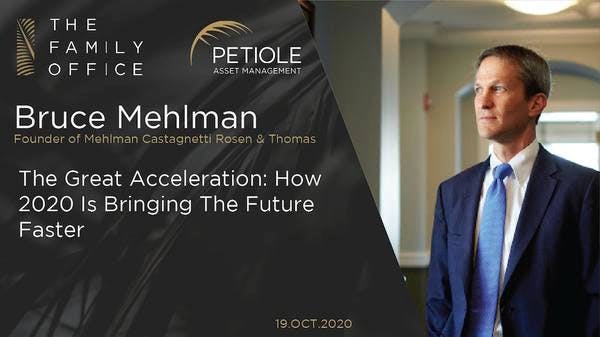Sep 19, 2020|Education- 4 min
For Mehlman, 2020 has rocketed society into the future. “I call this the great acceleration,” he explains. “because the events of 2020 will ultimately prove to be more accelerative than transformative.” He identifies seven core upcoming trends.
1. The fourth industrial revolution is accelerating
The rapid rise of technological innovation, also known as the “fourth industrial revolution,” continues to transform the way we work, live, and even socialize. And global lockdowns have accelerated our digital usage exponentially.
Firms and families alike have embraced digitalization as the new normal. Earlier this month, video chat platform Zoom became one of the world’s top 100 most valuable brands.1 These technological drives will continue to advance and bring new opportunities. “All these amazing innovations make us more productive, more innovative and healthier,” commented Mehlman.
2. A resilient economy is beginning
Markets peak and fall in cycles. As we go through a global recession, more defensive spending from businesses and governments alike is expected. “A lot of money is going to be invested in how we better prepare for future pandemics, promoting public health,” he explained.
A recent survey by McKinsey showed that 93% of manufacturing and supply chain professionals plan to focus on the resilience of their supply chains. 2 Pervasive preparedness, active cyber defense and smart infrastructure will play growing roles in economies.
Mehlman anticipates more public concern and policies around the climate crisis too. “Just as we failed to prepare for [the pandemic], there are going to be a lot stronger voices saying that we need to prepare for these climate challenges in a way that we haven’t been”.
3. The tech-lash looks to continue
Major tech firms such as Google, Facebook and Amazon have been under scrutiny for some time. Last year, Facebook agreed to pay a record $5 billion penalty to the Federal Trade Commission,3 and a $100 million fine to the U.S. Securities and Exchange Commission.4 And Google is facing antitrust charges from the U.S. Department of Justice.
Investors should expect more of the same. “There’s pushback against these digitally data dominant companies,” he explains. “It's not just Republicans, it's Republicans and Democrats”. Investors with heavy portfolio allocations to technology should pay close attention to this risk.
4. China and the U.S. will continue to jostle
Today’s world order no longer emulates the Cold War. The two superpowers are the U.S. and China, and how these different economies work together will continue to shape global markets. “The new world order is based upon this turn of a great power rivalry, the United States and China,” he explains.
Investors should prepare their portfolios for slowing cross-border flows and expect disrupted trade especially in the event of a Trump re-election.
5. A shrinking workforce as the world gets older
“Over the next three decades, in almost all the major current economies, you'll see their workforce shrink,” reveals Mehlman. World Economic Forum studies indicate that Japan’s workforce will be a staggering 20% smaller by 2040 due to partly declining birth rates and an aging population.5 2018 research from the U.S. Bureau of Labor Statistics paints a similar picture for America. As the huge baby boomer generation retires, the workforce will shrink.6 “That' will have a big impact on how societies operate,” elaborates Mehlman, “how they afford social safety, what their priorities and needs are.”
6) Post pandemic, both businesses and consumers could be more risk-averse
The impact of COVID-19 has been profound, with long-lasting effects on how we approach decisions across our business and personal lives.
Mehlman explains, “We're seeing change in mindset and changing prioritization.” As a society, our way of thinking has changed. We prioritize resilience over efficiency and our appetite for risk has decreased.
Keeping a steady income and staying safe have become key concerns for society, which could stunt business start-ups. “As we saw in the great depression,” Mehlman elaborates, “If you're out of a job for a long time, you’ll be much more cautious as a consumer, less likely to be an entrepreneur.”
7. The election results will impact U.S. policies
The U.S. election results will be a major driver of macro-economic events. “Who wins this election matters a lot,” empathizes Mehlman.
A continued Trump presidency would likely see immigrants suffer with less rights and zero government benefits. The Affordable Health Care Act would probably be scrapped too. The Trump administration is also likely to deregulate climate change actions. But U.S. businesses would benefit from continued tax cuts. Trump takes a protectionist approach to international politics, positioning America first. By not working alongside other nations, the continued divide between superpowers would stunt global economic growth.
By contrast, Biden is likely to restore the corporate tax rate to 28% and enforce climate change regulations, which could be detrimental to businesses, particularly fossil fuel companies. However, his stances on encouraging immigration and increasing the minimum wage to $15 an hour could offer a real boost to the workforce and individual spending power. By lowering the age threshold for eligibility to Medicare, the federal health insurance for senior citizens, a Biden presidency could restore some much-needed confidence in the U.S., which has been severely affected by the pandemic. Biden also has a more collaborative approach, which may help to heal some wounds of the recent trade wars and international tensions.
Key takeaways
✓ Businesses and consumers are becoming more risk-averse, as the pandemic shifts priorities
✓ Huge leaps in technology will continue, but tech giants will become more regulated
✓ A new world order is forming with China and the U.S. as the superpowers. U.S. election results will shape the outcome.
✓The workforce in developed economies is shrinking, which will have implications for healthcare and social security.
✓ A Biden victory would help ease macro-economic tensions, improve overall living standards, and focus on climate change regulations. A continued Trump presidency would spell more tax cuts for U.S. businesses and a more protectionist global approach to trade.

 Instagram
Instagram

